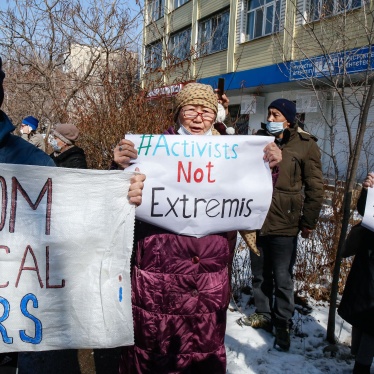Western governments are undermining the global ban on torture by transferring suspects to countries known for routinely torturing prisoners, Human Rights Watch and seven partner organizations said today in a joint statement.
In the statement, issued as the United Nations Committee Against Torture meets in Geneva, the groups called on governments to cease reliance on diplomatic assurances – empty promises of humane treatment upon return, sought only from governments with well-known records of torture – as a safeguard against torture and ill-treatment. The eight nongovernmental groups further urged the international community to make clear that the use of diplomatic assurances in the face of risk of torture violates the absolute prohibition in international law against torture and ill-treatment. This prohibition includes the obligation not to transfer people to places where they face a risk of such abusive treatment (the nonrefoulement obligation). No exceptions are allowed, even in time of war or public emergency.
“Governments know full well that assurances don’t protect against torture,” said Holly Cartner, Europe and Central Asia director at Human Rights Watch. “If the practice is allowed to continue unchecked, it will do real damage to the global ban on torture.”
Human Rights Watch and its partners are undertaking the initiative in response to growing attempts by governments in North America and Europe – including the United States, Canada, Britain, the Netherlands, Germany, Austria and Sweden – to send alleged terrorism suspects and others to abusive states based on diplomatic assurances that expose these individuals to serious risk of torture and ill-treatment upon return. The governments from which such assurances have been sought include some of the most abusive in the world—Syria, Egypt and Uzbekistan.
In addition to Human Rights Watch, the groups signing on to the statement included Amnesty International, Association for the Prevention of Torture, International Commission of Jurists, International Federation of Action by Christians for the Abolition of Torture, International Federation for Human Rights, International Helsinki Federation for Human Rights, and World Organisation Against Torture.
The groups issued the statement to inform ongoing discussions in international human rights bodies—including the U.N. Committee Against Torture—as to why diplomatic assurances against torture are inherently unreliable. The perceived need for such assurances is in itself an acknowledgment that a risk of torture and ill-treatment exists in the receiving country. Moreover, the assurances are based on trust that a receiving state will uphold its promise not to ill-treat the person upon return when the state’s record of torture demonstrates there is no basis for such trust.
“It defies common sense to presume that a government that routinely flouts its binding obligations under international law can be trusted to respect a nonbinding promise in an isolated case,” said Cartner.
Arguments by governments and others that monitoring the receiving government’s treatment of a transferred individual could make diplomatic assurances work ignore the serious limitations of such monitoring and difficulty of detecting many forms of torture and ill-treatment. Advocates of such assurances also overlook the fact that they have no legal effect, leaving the person they aim to protect no recourse if they are breached.
Any sending government has a fundamental disincentive to find that torture and ill-treatment have occurred – since to do so would amount to an admission that it has violated its own nonrefoulement obligation. As a result, both the sending and receiving governments share an interest in pretending that the assurances are meaningful rather than verifying that they actually are.
Among the countries whose torture records are being examined by the Committee Against Torture during its session is Canada, where the government’s “security certificate” regime permits deportations of alleged terrorism suspects to places where they are at risk of torture. During the review last week, the Committee questioned the Canadian government on its compliance with its obligation under international law not to return people to places where they face the risk of torture. It will issue its assessment of Canada’s record at the conclusion of its session, which ends on May 20.
The joint statement issued by Human Rights Watch and its partners also calls on the international community to reject any attempts to establish minimum standards for the use of diplomatic assurances against the risk of torture and ill-treatment as incompatible with the international prohibition on torture and ill-treatment.
“There’s no way that diplomatic assurances against torture can be made to work,” said Cartner. “Attempting to create guidelines is simply going to legitimize their use, undermine the torture ban, and ultimately expose more people to abusive treatment.”
The statement is available on the Human Rights Watch web site at: https://www.hrw.org/english/docs/2005/05/12/eca10660.htm
Human Rights Watch’s 91-page report, Still at Risk: Diplomatic Assurances No Safeguard against Torture, published in April 2005, is available at: https://www.hrw.org/reports/2005/eca0405/








